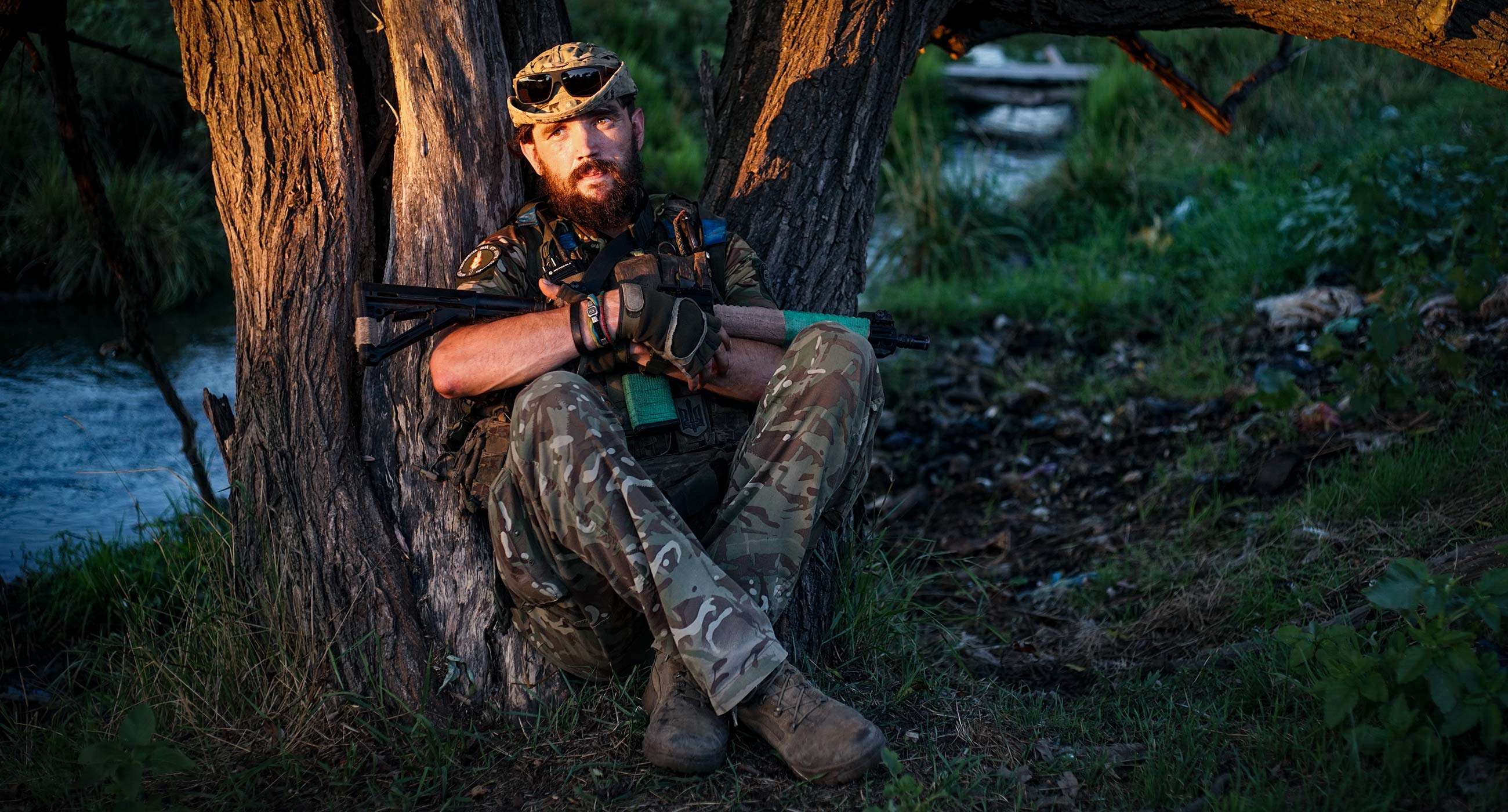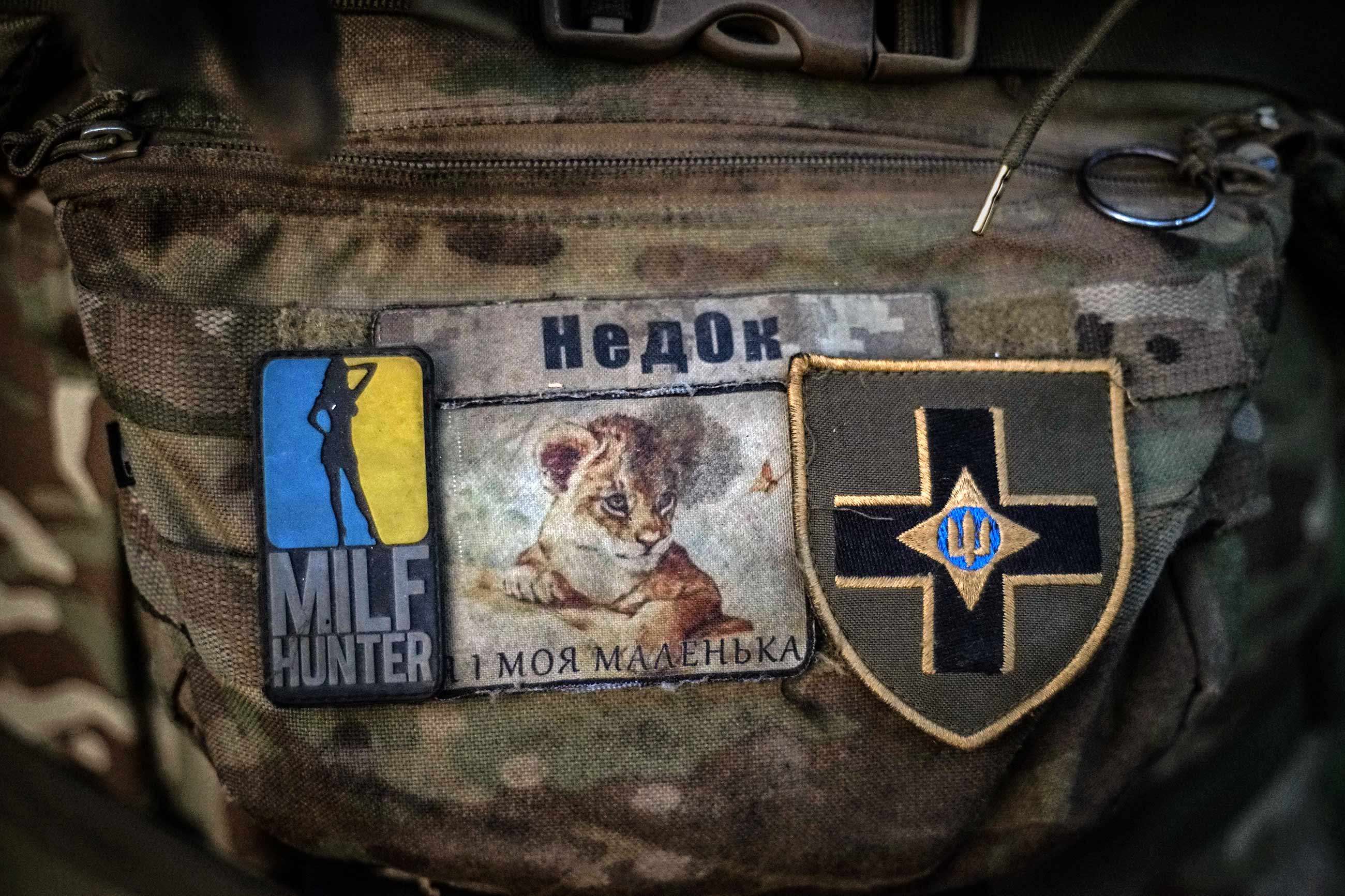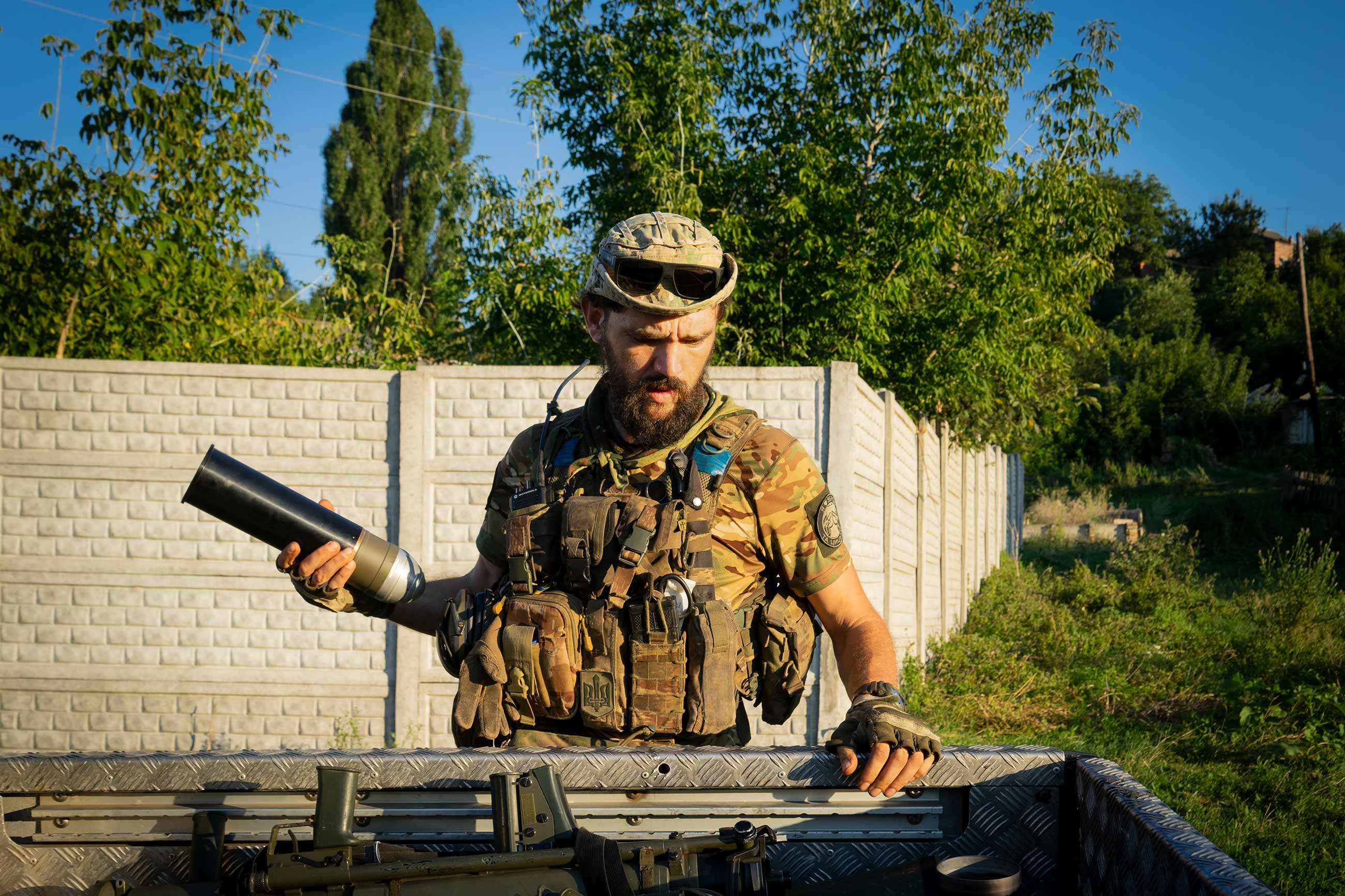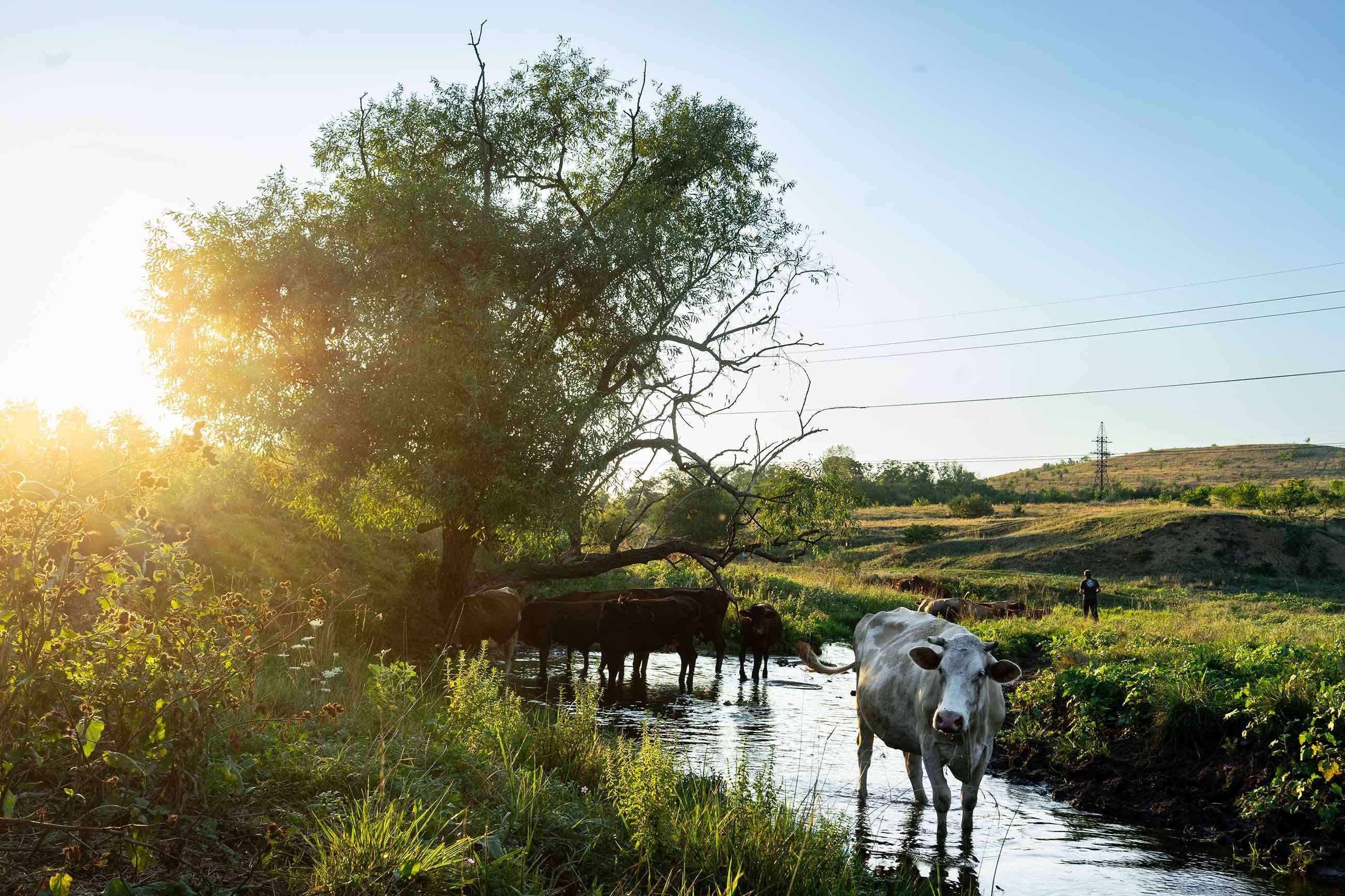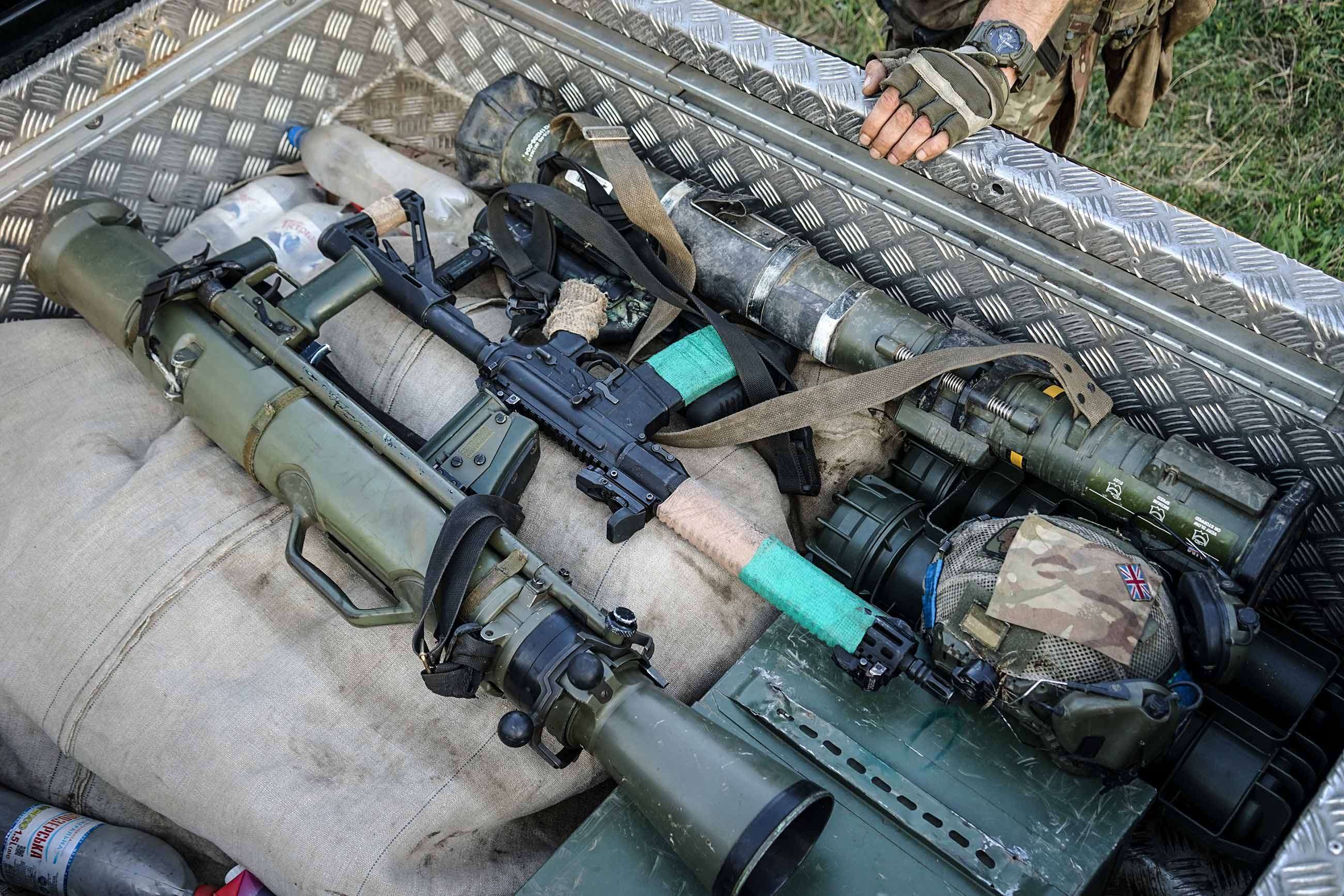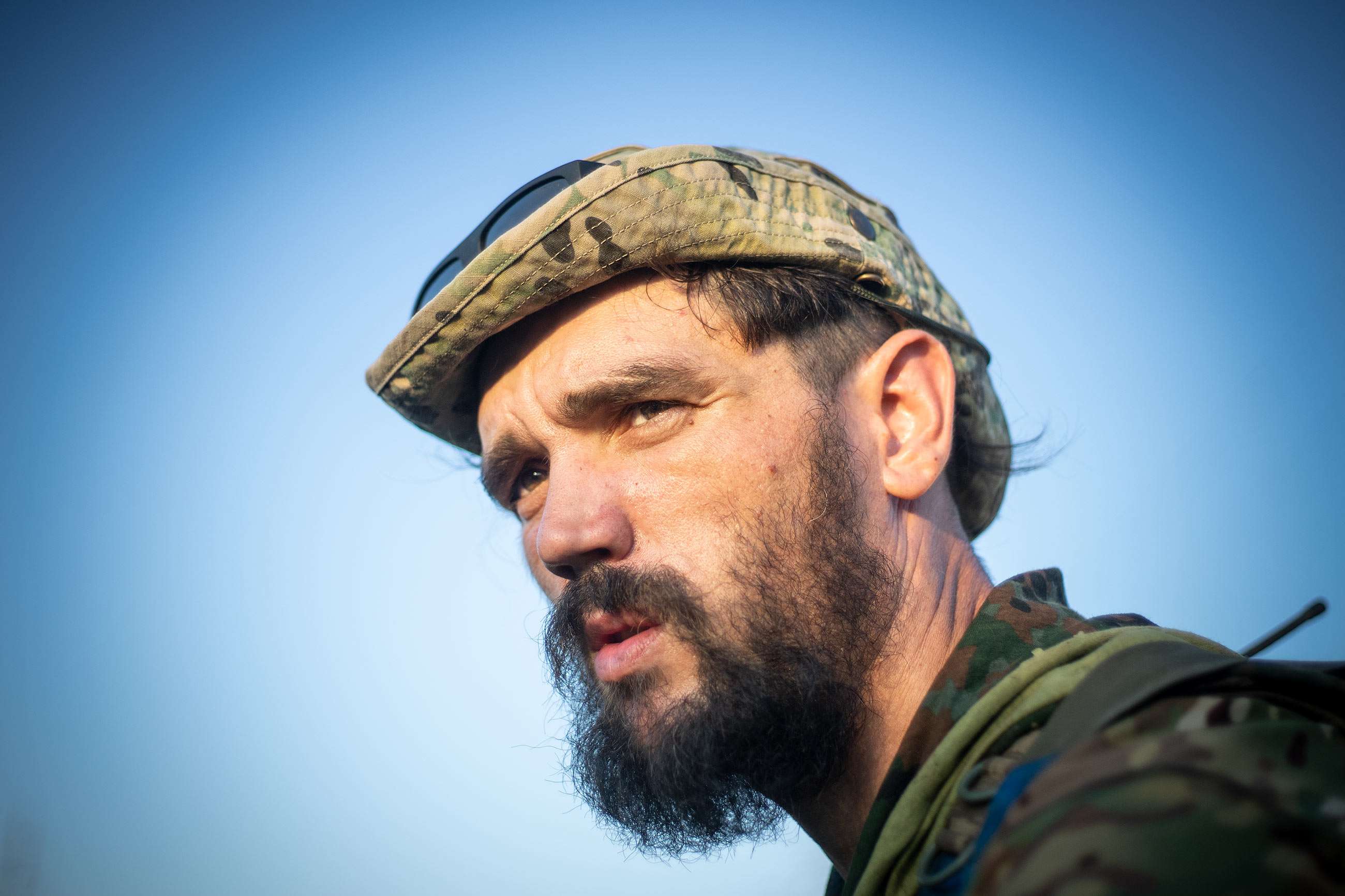Yuriy “Nedok” is 40 years old, he came to the war at the beginning of the full-scale invasion. Now he is a company’s chief sergeant in the 28th separate mechanized brigade named after the Knights of the Winter Campaign. As a member of the brigade, Nedok has defended Mykolaiv, Kherson, and now Donetsk regions. Zaborona journalist Polina Vernyhor met Nedok near the front line and talked to him about his path to the position, the loss of his brother, combat operations on the front line, and his perception of death.
How and when did you get to the war?
I went to war right after the full-scale invasion began. At that time, my wife had been serving in the army as a paramedic for 4 years. I knew that there would be a full-scale war in about two months. My wife (now ex-wife) serves in the 57th Brigade. She was just on rotation — which, by the way, is why the Russians entered the Kherson direction so freely. Because the 57th Brigade is Nova Kakhovka, and they were in the sector. And who was left there? Only the permanent dislocation point of the military unit.
My wife told me that their command and observation post was shelled twice in two weeks, and two officers were killed. Then I saw in the media that blood was brought in. I had lived with a medic for eleven years and realized that blood is a product that is not brought to training, so it was a sign that an offensive was being prepared. I thought it might be in Donbas. Nobody knew about the six directions.
On the 24th, I first went to the Right Sector, where I was enrolled. But at that time they had no weapons. There were only five assault rifles.
On February 25, I came from Odesa to Kropyvnytskyi. But on the way I was recorded by cameras because I was wearing Odesa license plates, which on the second day of the Russian invasion was perceived suspiciously, saying that I could be a subversive group.
I stopped to refuel and was about to leave when suddenly I was being squeezed from two sides by two police units, a third in front and a bus from the SBU behind. I can say that this was my first combat experience — they pointed guns at me and I had to stand up and behave properly so that they wouldn’t shoot at me.
Then they figured it out, saw from my military ticket that I was going to my military commissariat, and let me go. There was a panic in the military enlistment office, a lot of people. At that moment, the weapons were brought in, and the captain did not understand how to distribute them, because he was approached from everywhere: “Man, give me a machine gun”. I got involved in the process and we organized people: we gave weapons by name. We finished with the weapons, set up a checkpoint, and set up a medical center at the military registration and enlistment office.
This is very different from what you are doing now. How did you end up in the infantry?
I sat there for a couple of days, nothing was happening, and I asked to join the 57th Brigade, my wife’s brigade. The captain told me: “I can’t send you because they are surrounded. Choose: 28th Odesa or 35th”. So I chose the 28th Separate Mechanized Brigade named after the Knights of the Winter Campaign, because it is ground troops. I planned to transfer to the 57th later, and it’s easier to transfer from the ground forces to the ground forces than from the Marines.
So on February 28, at 7 a.m., I was already on the bus to Chabanka. First, I was sent to the brigade commander Vitaliy Huliyev. When he found out that I was a radio-telegraph operator, he said that I would sit in the basement at the headquarters — they needed specialists. I did not agree, and I was sent to the infantry.
While I was waiting in line for the assignment, I looked at the computer to see what positions the people in front of me were taking. There was no combat medic, no paramedic, no rifleman, no doctor. And when it was my turn, I was asked what else I could do besides communications. I answered that I could give injections and was ready to pull out the guys. So I was sent to a reconnaissance platoon as a combat medic. That’s where my call sign Doc came from. And when I saw that there were too many patients there and a combat medic could not help them in Pivdenne, I called a doctor I knew and persuaded him to go to serve in the Armed Forces.
When he arrived, there was confusion. Someone shouted: “Doc!” and we both ran. I suggested: “Let’s do it this way: now you are a doctor, so you are Doc, and I am not a doctor — Nedok (“not doc” in Ukrainian).” And that’s how it happened. I don’t change my call sign anymore because it is unique. Because no one wants to be Nedok — everyone wants to be Doc, Cat, Gray, Beard, but not Nedok.

Photo: Ivan Chernichkin / Zaborona
Later, I ended up joining the infantry. I talk a lot, and the army doesn’t like it, so they sent me away to the infantry. Guys quickly shut up there [infantry soldiers are more likely to die]. Then, in the Kherson region, I was thrown into an assault group, and there I understood better what real war is. Because it’s one thing to sit in a village in the basement, and quite another to go on the offensive.
You mentioned that your ex-wife, like you, is a soldier. How did you explain to your son that you were also going to war?
The day before, on February 23, I bought two train tickets to visit my brother in western Ukraine. I told my father-in-law: “Either you go or I do.” He agreed. When I got home, my son was crying and said: “Dad, why are you doing this? My mom is already at war. Why not someone else?” He will remember this to me someday.
I answered that every man has to defend his country. I repeat it every day to all my newly arrived brothers: if you were born with male appendages, you have to defend what’s yours.
Who is he with now?
My ten-year-old son has been living with my father-in-law and mother-in-law for a year and a half — we have seen each other four times. I feel like I’m losing my child. He has become completely different. I taught him that goodness and truth should come first, that a small lie for the sake of a great good is unacceptable because any lie grows out of a big lie. Now he has started to lie, he calls me only when he needs money. The child has neither a father nor a mother. The grandparents have spoiled him and the child is changing.
My father-in-law was a military man all his life — mostly in the Soviet army, and then in the Ukrainian army he served as a division commander. He saw the collapse of our army and lost faith in the Ukrainian troops. It was difficult to convince him that the Russian army was inhuman because it was a model for him.
His “enlightenment” came only when the Russians themselves showed him that they were fighting with convicts. For him, as an officer, this is unacceptable, because there is an officer’s honor, a concept that has long been forgotten in the Russian army. I could see in his eyes how his ideals were crumbling, how this model army in his imagination was gone.
My mother-in-law attends the Moscow Patriarchate [UOC] church and has become a catalyst for many quarrels in the family. She accepts one-sided truth and does not want to look at other sides of the situation. I think she would love to go to Russia, but neither I nor my ex-wife will allow it.
You are now the company’s chief sergeant, which means that you are always close to your subordinates, including on the ground, and you are well-versed in battlefield tactics. But you had no combat experience before February 24, 2022, right?
I served in the army 20 years ago, but I had no combat experience before that. In 2015, I came to my military enlistment office — I found an ad on OLX looking for a communications sergeant. I was a radio relay station manager and radio telegrapher by profession from conscript service. The military enlistment office told me that all the sergeant positions were taken. So I started volunteering.
I believe that I was born a military man, I just grew up in a time when the military was not appreciated. When I was an enlisted man, a sergeant who stayed on a contract was paid ₴700 in Dnipro. And it cost ₴500 to rent an apartment in Dnipro. How can a young sergeant survive? I earned three times as much as a loader. That’s why I was a civilian.
I dropped out of the Communications Academy, so I don’t have a higher education — I can’t be an officer yet. Now I am a chief company sergeant. This year, I re-entered the Communications Academy to be able to get an officer’s rank in the future.
When we were in the Mykolaiv direction, a shell hit the second floor of the building where we were staying. The Russians began to use the following tactic: one shell arrives without a fuze, and the second with it. The first shell pierced the wall, the second exploded inside. We were covered with concrete, and the shell ricocheted to the second floor. If it had been a fuse, it would have killed everyone.
Luck means a lot. Our skills and knowledge increase the chance of survival during work. But, for example, a missile is going to come here and it won’t matter that I have experience and you don’t — we will all die the same way. Well, with a 99 percent probability, because someone may be thrown away, only the arms and legs will be torn off, but they will be alive.

Photo: Ivan Chernichkin / Zaborona
What is the worst thing about war for you?
Six months later, when I stopped waking up during attacks, I became scared. About six months into the full-scale war, I was giving an old man a ride in the Kherson region and asked him: “Are you scared? Yesterday you were shelled with 152-caliber artillery”. And he said: “No. It was scary in March when Russians were here on tanks, but now we are used to it.” When a person gets used to it, they feel calmer inside, I guess, but there is another side to the coin. If you don’t understand what is happening around you and get used to it, it also leads to serious consequences. You lose your reaction when it is necessary. We need to think and analyze everything that is happening around us.
I realized that time is the most important thing a person has. Moments spent not with your child, but with your buddies in the bathhouse — you can’t get them back. We don’t notice this because of our everyday life. And when you dig a hole to take a shit because you can’t get out of the trench, when you force yourself to eat because you realize that you need to dig, you need strength, then you only realize the value of time.
I am no longer afraid of death. When the frozen body, which looked so much like my younger brother, fell onto the stone table, I realized one thing: death would come to us all. Sooner or later, everyone dies. Therefore, being afraid of it is a waste of time.
Did your brother go to war with you?
My brother’s name was Dmytro, he was three years younger than me — he would have been 36 now. At the beginning of the full-scale war, he took my son and his family to Poland, and he returned, came to the military enlistment office in Chortkiv, and was sent to the airport security battalion. He served there for four months. Later he wrote to me: “Brother, I can no longer paint fences, I want to join a combat brigade.”
Secretly from his wife, he wrote a report. His family raised $5,000 to buy him a white ticket, and he bought a car and equipment and went to a training unit. From there, he was assigned to the 66th separate mechanized brigade, and in two months, he, a civilian until recently, became a reconnaissance group commander. When he became a soldier, he took the call sign “Phil”. He was so proud when people started calling him by his call sign. He was respected by his comrades and recognized as a senior.
I did not take my brother to the 28th Brigade. When I was still in reconnaissance, we were called on the radio to help with evacuation. We saw two brothers on the spot: one of them was missing a leg, the other — both. There was a shelling, one of them was wounded, and the other tried to pull his brother out. He was also hit. They survived. If they had died, it would have been half the trouble, but now they are both crippled and no one will want them. They are potentially two suicidal people. So at least one of them would have looked after the other if he hadn’t gone under fire to pull him out.
When you have a loved one next to you, for whom you are worried, you are not one hundred percent concentrated, because you think not only about yourself. So we decided: where my brother goes, he goes.
When they were in the Lyman area, the group he was going to replace missed an ambush between the reconnaissance and infantry. So on December 6, 2022, my brother’s reconnaissance group was ambushed. Five 200s, two heavy 300s.
He was taken away two days later. The only good news is that his injury was incompatible with life, it was instant death. They hit him from behind in the liver, under the armor — although maybe he did not have armor. Scouts often go without it because they need to be light and mobile.
His wife called me and said: “They are asking for Dima’s photo. He has gone missing”. I immediately realized what had happened, because a photo is not required for a missing person, but they asked for an identification.
He was buried at his wife’s request in a closed coffin. My mom still hasn’t forgiven me for not letting her see him. He was better than me, much calmer.
He protected his family not only physically, but also psychologically: when he came home, he didn’t tell them anything so that they wouldn’t be nervous. On the contrary, I tell everyone what war is. Because it’s not romance — it’s sweat, tears, blood, nerves, guts, and brains.

Photo: Ivan Chernichkin / Zaborona
This is true, but a year and a half has passed, and the state must motivate new people to join the service to replace those who are working at the limit of their strength. Perhaps this romanticization of the war is being done for this purpose. Besides, we need to “save face” in front of our Western partners.
I don’t need people who need to be motivated to serve. Rather, I need one out of ten who understands where they are going. Because they will bring ten people: half of them will run away, and the other half will look for a pregnant woman with three second cousins so that they have a reason to officially resign.
I realized why we are here only when I came to Donetsk region. There is nothing here anymore, the locals live only at the expense of the military, they don’t care whether it is Russian or Ukrainian. The more defeat we inflict on the Russians, the better. This is the motivation, we don’t need anymore.
You have been in Donetsk region for nine months. Tell us about the most difficult operation here.
It was April, Easter. We were closing the last road to Bakhmut, which went through Khromove. It was hell. If we had withdrawn, all the troops that were in Bakhmut would have been surrounded and destroyed, just like in Mariupol. It was not a criminal order, as some people shouted, we were doing it for our brothers.
I saw an enemy tank through my binoculars and couldn’t believe it was only two and a half kilometers away. It was shooting directly at my back, destroying all ammunition stocks. And before that, SPG was shooting with grenades from that direction all day long. The Russian army had completely outflanked our troops in Bakhmut and was already entering the fields behind us, with attack aircraft working in front.
The order was for the battalion to move in, help, and close the left flank of the 57th Brigade, with the 92nd Brigade on the right. We went in for half a day and then came out for another half a day — instead of two days, my company stayed there for three. And the next one, which was supposed to replace us, decided to go in faster. The Russians spotted them, thought they were assault groups because they came in ten at a time, and covered them with fire.
We got two days of rest. My men went to the bathhouse, and when they came back, my company commander wrote to me: “Gather people in Chasovyi Yar, we need help for the other company”. The next day, three groups were brought there.
The enemy approached the neighboring company from the right through the 57th Brigade, which resulted in the loss of the center. And they dispersed to us and the 92nd Brigade. In other words, they pushed through one weak unit and flanked the others. They cut off our guys from the neighboring company, they stayed there and we don’t know if they were killed or captured.
We were left with only a piece to asphalt road — I got there with my group, left one group further in the dugout as an evacuation group, and one group in another place with machine gunners to cover the flanks so that the Russians would not be so brazen in crossing the road. The shelling was very dense — people were burning. The trenches were up to my knees, you couldn’t hide much. The guys were sitting at a distance from each other. One attack, and you should rely on your luck: that one is 200, those two are 300s because there was nowhere to hide even from the debris, everything was ground up.
By the end of the second day, I returned from evacuating another wounded man to my men on the right flank, and four more fighters from the 57th Brigade came to them. My men were all alive, but all of them were shell-shocked. Their condition was hardly adequate: one of them stood up and was filming something with his phone while a tank was shooting at him. I sent them to evacuate with the wounded man, and I went to get a machine gun and returned to these four from another brigade. While I was busy, two of them were wounded, the other two were intact. I told the latter to take the wounded and evacuate.
I told the commander that I was alone. He told me that a “bird” [reconnaissance drone] was watching me to inform me about the possible approach of the enemy. Later, reinforcements arrived, and the Russians moved the mortar to the right side and began to attack the flank, taking out every gap. In the morning, they hit near me. Then I lost consciousness for a short time, I thought I was falling asleep.
We stayed there until about two in the morning until they found someone to replace us, and then they took us out. In such operations, the human factor, the personal qualities of those who are directly on the battlefield, plays a big role. There are no low-level commanders because everyone wants to be a battalion commander right away. No one wants to be a sergeant, so I remained a sergeant.

Photo: Ivan Chernichkin / Zaborona
At that time, the distance to the Russian positions in Khromove was minimal. Did you have to communicate with the Russians personally?
At that time, a Russian soldier was captured near Khromove. The events happened like this: three people were running, we put two of them down, and one threw down his weapon and came to us under our mortars. We took him prisoner and asked him: “What are you doing, you’re going to die anyway — three people against ten in the defense.” And he said: “We have orders. If we go back, we will be shot. And this way I can either get captured or become one of the 300, and then maybe they will take me away — either you or them.”
There was also a case with my fighter Kozak [call sign]. He’s 53 years old, he was a border guard in 2014, then he was in the air defense, transferred to the infantry, and I made him a sniper. We were sitting in our positions, and he called the 57th and 28th brigades on the radio — he must have been calling for ten minutes. And then he gets a response in Russian: “Go your way”. He looks out of the trench, sees the position from which they are responding. And the commander says into the radio: “No, it’s not the 57th, it’s the Russians”.
The Russians have to be destroyed because they are adjusting their actions and can work out the flank. Kozak believes in people so much that he says: “I talked to him, he’s a human being. I can’t just take him and kill him and not give him a chance. Let’s give them a chance to surrender.” We gave them one hour to think about it. He crawled over there, a Russian came out, they were talking about something — they were talking about surrender.
All he could do was give them a chance. An hour passed, Kozak said: “If they didn’t use their time, then I’ll go and destroy them.” I thought there were two of them, but there were more than six. He killed three of them, threw a grenade for cover, wounded another, and attacked with grenade launchers at the rest.
Over the past year and a half, you have experienced many tragic events and seen a lot. This experience often causes anger and a desire for revenge. How do you manage to keep yourself from killing these prisoners on the spot?
You know, when I came back from my brother’s funeral, I cried a lot. It’s all nonsense that “men don’t cry”. But now we have no right to cry, to remember, and grieve, because there is a war going on. We need to be as concentrated as possible. And I asked God, the highest power, not to take revenge. Because you can get so involved in retaliation that you will die. You have to do your job: in the rear, at the front, at the factory, at the construction site. Now I like working with people. I get up and work. This way, I can distract myself and at the same time feel that I am moving the war forward; it calms me down.
I often ask the military about their dreams and plans after the war. However, most do not want to make plans, because in a situation where you are surrounded by death every day, it is difficult to dream about anything. How do you feel about it?
I would probably call it not a dream, but a mission: to win and survive in order to teach the younger generation. Because those who are hiding from the war and who do not know how to fight are left behind. And there is no one to teach our children. And the children of our fallen comrades are especially unnecessary. There were so many people at my brother’s funeral in Chortkiv — everyone praised Dima, said only good things about him, and sympathized. Six months have passed — how many people do you think have come to visit his children during this time? One: his godfather went fishing with his son once. And in five years, no one will need him at all.
I divorced my wife. She found someone else — that’s life. And I fell in love with another woman who supported me after my younger brother died. She has two children, and her husband also died in Donbas. Her eldest daughter is 18 years old and entered the Ground Forces Academy to become an aerial reconnaissance officer.
And my niece, who is now 14 years old, once said: “I have already started to forget my dad’s voice and his face. But I will be a scout like you”. These children lost their father in the war, but they want to connect their lives with the army.
“About six months ago, I decided that after the war I would organize camps for children aged 13 to 17, for the half-orphans of our brothers. Because no one will want them and they may lose faith in people. We need to support them.

Photo: Ivan Chernichkin / Zaborona
And in these camps, you can give work to your fellow soldiers who are crippled. PTSD is only half the problem. I have PTSD, but I’m still in one piece and can work. And sometimes you have no leg or arm, or when your brain is so liquefied that there is nothing in your head because of the concussion, you don’t remember anything, you have constant headaches, and no one sees it.
Or like Kozak, who was with me in Khromove. He killed three enemy scouts, wounded a fourth, and left the battle with a head wound — his skull was injured, but not pierced. Under this dent, a tumor formed, and now it is paralyzing the entire left side of the body. Everything indicates that the tumor is pressing on his brain.
I trust these people, they can be useful. It is very important for them.

